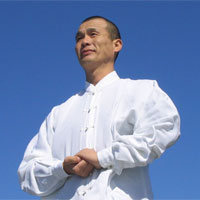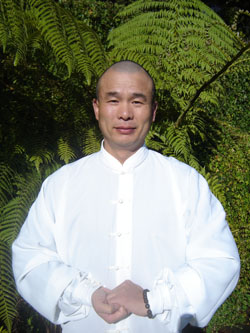Yuan Tze Master Qi Gong Teacher

Yuan Tze was born in 1962 in Rudong County of Jiansu Province, China. While only a baby, he was taken to live at a Daoist monastery and lived there until the age of 4. He sees this as the beginning of his journey to follow the Dao. At the age of 7 Yuan Tze began practising martial arts.
At 17 years of age, he started Daoist Qigong, and then later studied Confucianism, Buddhism, traditional and modern Qigong, Folk Qigong, Traditional Chinese Medicine and folk medicine, following a number of great Masters in each. Yuan Tze considers himself very fortunate to have met these Masters and to have received secret teachings from them in various areas. Many of these Masters were reclusive hermits or people who do not reveal their abilities. These people had acquired knowledge and special abilities passed down from Master to disciple through generations and had reached very high levels of realisation. They accepted only one or two disciples throughout their lives.
Yuan Tze has reached a high level of realization and has developed special abilities through his Masters' physical, verbal and heart-to-heart teaching and through his own hard work. He believes this practice and experience has brought him deep understanding and a breadth of knowledge that provides a sound basis for further development. Although he earned the title ‘Master’ in his early twenties, Yuan Tze eschews the use of this title, preferring to be known as Yuan Tze, his name of cultivation, or Liu Laoshi (Teacher Liu). He considers that the term ‘Master’ has been diminished by improper use and that true abilities are more important than any title.
At 27 years of age, Yuan Tze had begun preliminary work to develop a new Qigong system when he met Professor Pang Ming, the founder of Zhineng Qigong. He was pleased to discover a theory and method very close to his own ideas, so gave up the idea of a new system and started to learn and practise Zhineng Qigong. Quitting his job, at 31 he left everything behind to devote himself to Zhineng Qigong. He moved to the big Huaxia Centre north-east of Beijing (which contained up to 7000 people at its peak) where he undertook the highest level two year live-in Teachers' course, taught by Professor Pang himself. Of the 800,000 - 1,000,000 people who have learned the methods of Zhineng Qigong, only 700 have done this live-in course, with fewer than 200 taught by Professor Pang himself.
At 33, on completion of the course, Yuan Tze was invited by Professor Pang to stay at the Institute to teach and work there. During that time he worked as Director of two units of the Recovery Department, one of which housed those people with cancer and the other those with other serious illnesses. At all times there were more than 10 instructors and around 400 patients under his management. During this period Yuan Tze had the highest success rate in dealing with illness at the Centre, including cancer and lithiosis (stones of the kidney, gall bladder, etc).

There were even cases of the regeneration of tissue and of organs which had been surgically removed growing back, including cranial bones, gall bladders and uteruses. One especially amazing case was of a kidney removed 36 years before which grew back - this is believed to be the only such case in medical history. During these years Yuan Tze made important contributions to Qigong healing, teaching and research and in 1996 the Chinese Qigong Research Association, the highest governing body of Qigong in China, invited him to become a Special Member, along with only two other Zhineng Qigong practitioners, Professor Pang Ming and Yuan Zhen Zhai (now deceased).
At the end of 1996, in order to further develop himself and to promote Zhineng Qigong, Yuan Tze left Huaxia and travelled widely in China over a period of several months. He set up local Qigong Associations and did teaching and healing, travelling as far as Vietnam. Yuan Tze then settled in Yanjiang in Guandong Province, where he set up and ran the Zhineng Qigong Healing and Training Centre and the Zhineng Qigong Research Association. During this same period he also set up a health centre in Zhuhai, Guandong Province.
He continued to treat various illnesses with outstanding results, helping people with their spiritual development as well as their physical and mental problems. People in these areas embraced him with gratitude and love for the work he did, and with great respect. The Yanjiang practice closed at the end of 1998; the practice in Zhuhai continued until early 2001 when Yuan Tze left to further his Taiji.
His achievements during these years attracted the attention of a number of other organisations and he was invited to make contributions in the following ways: Chairman of Qigong Culture Development Committee for South China for over two years
An editor of the Dictionary of Contemporary Qigong Masters Visiting Research Fellow of the Tianjin Zhong Yi Sheng Biological Science Institute Visiting Professor and Standing Director of the Chinese No-Medicine Therapeutic Institute Committee member of the Chinese Massage Specialist Association, a high-level academic institute for Chinese massage Several notable Chinese publications include material on Yuan Tze. These include the 'Blue Book of the World' which carries information on important contemporary Chinese professionals; 'Scientific Chinese' which details outstanding professionals; the 'Dictionary of Contemporary Chinese Qigong Masters'.
While Qigong has been Yuan Tze's main focus throughout his adult life, he has also learnt a number of different Taiji styles. He spent much of 2001 as a formal disciple of the 5th generation teacher of the Yang family's secret original teachings of Yang style Taiji. He is one of only 51 taught by Wei Shu Ren, of whom fewer than ten are now practising. Like Qigong, this Inner Method Taiji combines Shen, Yi (the active mind) and Qi with form (the movements). Yuan Tze taught this Taiji in Wellington from 2003-2004. This was the first time this original form has been taught publicly outside China.
Yuan Tze believes that his Qigong cultivation has given him a deep understanding of human life, especially the role played by the consciousness in health, and the importance of transcending and elevating oneself. He has been doing pioneering work in the treatment of emotional and mental disorders and giving guidance in spiritual development. There have been many breakthroughs in solving health problems at the root level so as to treat the whole person not just the illnesses.
Yuan Tze arrived in New Zealand in February 2002 and worked for 2 organisations before creating the Yuan Tze Centre in October 2003. Although Qigong was something fairly new and unfamiliar to most New Zealanders, Yuan Tze's powerful work has enabled more and more people to experience substantial improvements in their health and life, and Qigong
has become better known and accepted in New Zealand. In his own words, "I would like to introduce the essence of traditional Chinese culture, combined with modern knowledge, to people in New Zealand and the world, and make every effort to help people enhance their physical, mental and spiritual health. In this way, more and more people can live a life of health, happiness and wellbeing".